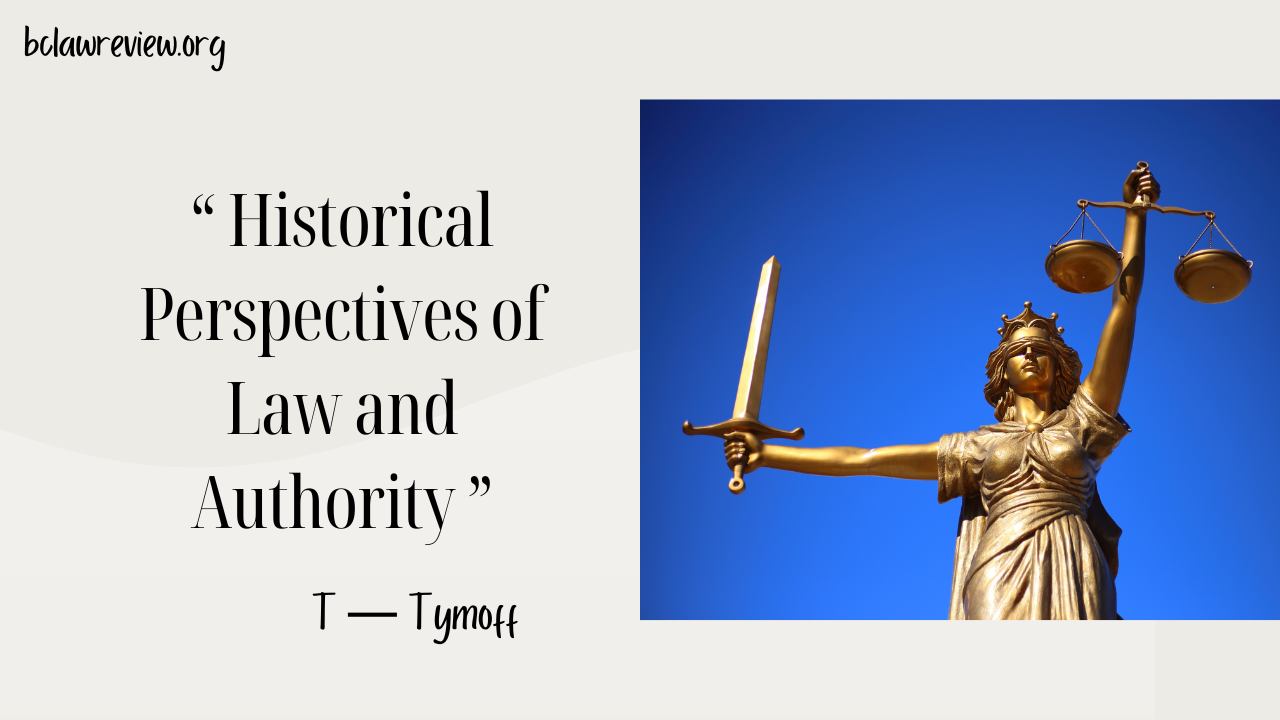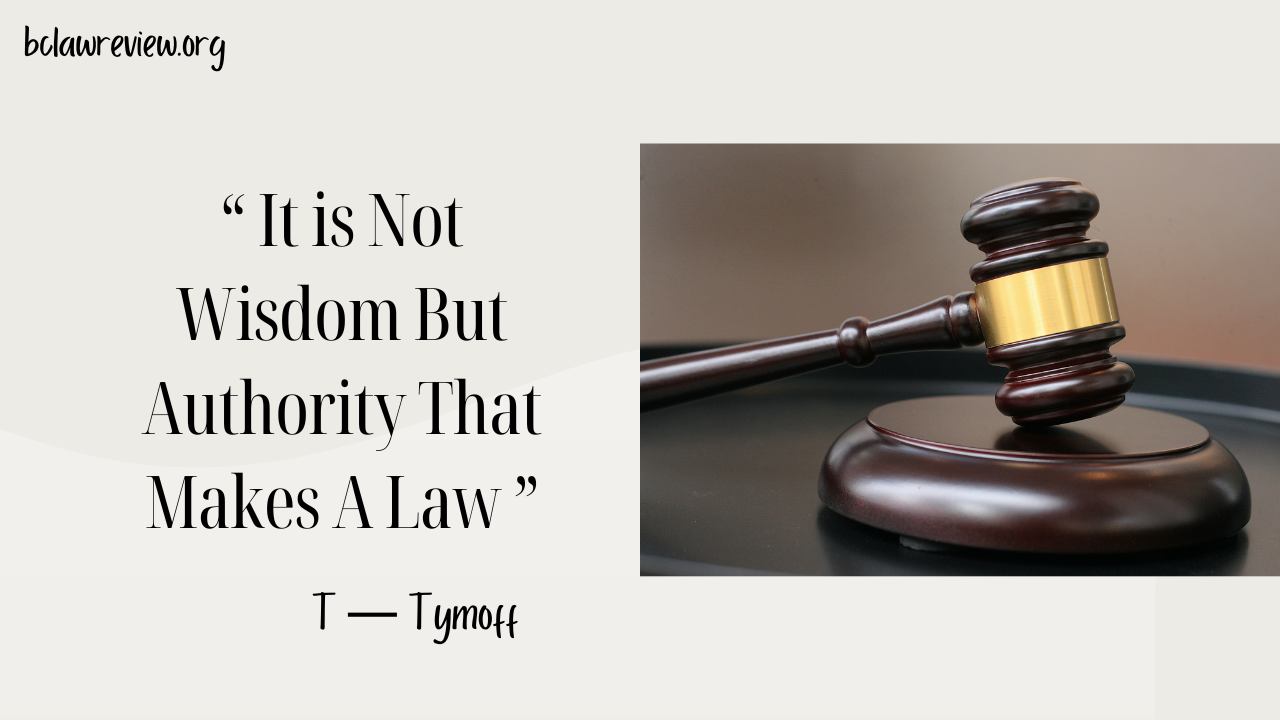Laws are the foundation of any organized society, guiding behavior and maintaining order. The quote “It is not wisdom but authority that makes a law” by Tymoff brings forth the idea that the laws often rest in the hands of those with power rather than those with wisdom.
It conveys a profound truth about the nature of law and governance. Wisdom is often idealized as the foundation of just and effective laws, the reality is that authority—the power to enforce and implement—plays a more critical role.
Legal systems have evolved over centuries, influenced by cultural, social, and political changes. Examine Tymoff’s assertion, the historical evolution of legal systems, and the impact authority-driven laws have on society.
Contents
- 1 The Nature of Law
- 2 Historical Perspectives of Law and Authority
- 3 Modern Legal Systems of Law and Authority
- 4 The Impact of Authority-Driven Laws
- 5 How to Balance Wisdom and Authority
- 6 Case Studies – It is Not Wisdom But Authority That Makes A Law
- 7 Statistical Overview: Authority vs. Wisdom in Lawmaking
- 8 Conclusion
The Nature of Law
Laws are established rules and principles designed to maintain order, protect individual rights, and promote justice within a society. They provide a framework for acceptable behavior, resolve disputes, and set penalties for violations.
The primary purpose of the law is to create a stable and predictable environment where individuals can coexist peacefully.
Wisdom vs. Authority
Wisdom refers to the ability to make sound judgments based on knowledge, experience, and ethical considerations. An ideal society would craft laws that prioritize justice, equity, and the common good.
Meanwhile, Authority is the power or right to give orders, make decisions, and enforce obedience. It is common for authorities to create and enforce laws regardless of their wisdom or moral standing.
Historical Perspectives of Law and Authority

1. Ancient Legal Systems
In ancient civilizations, such as Mesopotamia, Egypt, and Greece, laws were established by rulers who wielded significant authority. The Code of Hammurabi is one of the oldest known legal codes and was created by King Hammurabi of Babylon.
While some of these ancient laws reflect a degree of wisdom, they were ultimately products of the rulers’ authority and desire to maintain control.
2. The Roman Influence
Roman law significantly influenced the development of Western legal systems. Roman law is based on the Twelve Tables, which were compiled by the Roman Republic.
Over time, Roman law evolved, incorporating principles of justice and fairness. However, the authority of Roman emperors and magistrates remained central to the creation and enforcement of laws.
3. The Middle Ages and the Divine Right of Kings
European monarchs ruled with the belief in the divine right of kings during the Middle Ages. According to them, their authority comes from God. This period saw the establishment of feudal laws that reinforced the power of the nobility and the church.
While some monarchs sought to rule wisely, their authority was the primary driver of lawmaking.
Modern Legal Systems of Law and Authority
1. Democratic Principles
In contemporary democratic societies, laws are created through representative institutions, such as parliaments and congresses. These bodies are elected by the people and are supposed to reflect the will and wisdom of the populace.
However, the authority still plays a crucial role. Elected officials hold the power to create and enforce laws, and political, economic, and social pressures can influence their decisions.

The effectiveness of law enforcement varies widely between countries, influenced by the level of authority and the rule of law.
| Country | Rule of Law Index (2023) | Law Enforcement Effectiveness (%) | Notes |
| Denmark | 0.89 | 92 | High trust in the legal system, robust enforcement |
| United States | 0.74 | 80 | Strong judiciary, but varied enforcement |
| China | 0.48 | 85 | Authoritarian enforcement, limited legal recourse |
| Nigeria | 0.36 | 45 | Weak legal system, corruption issues |
2. The Role of the Judiciary
The judiciary interprets and applies laws, ensuring they are consistent with a country’s constitution and legal principles. Judges, who hold significant authority, can shape the law through their rulings.
While judicial decisions are ideally based on wisdom and legal reasoning, the authority of the judiciary is paramount.
3. Authoritarian Regimes
In authoritarian regimes, laws are often created and enforced by a central authority with little regard for wisdom or justice. These regimes prioritize control and stability over individual rights and freedoms.
For example, A dictatorship’s laws impose an absolute ruler’s authority and suppress any dissent.
The Impact of Authority-Driven Laws
1. Positive Outcomes
Authority-driven laws can lead to stability and order, essential for a functioning society. Strong authority can effectively enforce laws, deterring crime and protecting citizens. In times of crisis, decisive authority can enact laws quickly to address emergencies and protect public safety.
2. Negative Consequences
However, laws created solely by authority can also lead to injustice and oppression. Without the tempering influence of wisdom, such laws may reflect the interests of those in power rather than the common good.
Historical examples include apartheid in South Africa, segregation laws in the United States, and totalitarian regimes that suppress dissent and violate human rights.
How to Balance Wisdom and Authority
It is Not Wisdom But Authority That Makes A Law but an ideal legal system should balance wisdom and authority.
Individuals should create laws that both possess the authority and wisdom to ensure that they are just and equitable. This balance can lead to a fairer legal system that serves the interests of all members of society.

Achieving this balance is challenging. Social divisions, power dynamics, and special interests often influence political systems. Ensuring that wise and just individuals attain positions of authority requires robust democratic institutions, education, and civic engagement.
Civil society is another factor that’s crucial in balancing the system. The non-governmental organizations, advocacy groups, and the media play a crucial role in promoting wisdom in lawmaking.
These entities can hold authorities accountable, advocate for just laws, and educate the public about their rights and responsibilities.
Case Studies – It is Not Wisdom But Authority That Makes A Law
1. The United States Constitution
The United States Constitution exemplifies an attempt to balance wisdom and authority. The Constitution established a framework for governance that includes checks and balances to prevent the abuse of authority.
The Bill of Rights (a product of wise deliberation) protects individual freedoms against governmental overreach.
2. The Nuremberg Trials
The Nuremberg Trials, held after World War II, were a landmark in international law. Tribunals were established by the Allied powers, but their trials were guided by law and wisdom.
They set a precedent for prosecuting crimes against humanity and underscored the importance of accountability.
3. Modern Examples
Contemporary examples include the legal reforms in countries transitioning from authoritarian regimes to democracies. These reforms often involve rewriting constitutions, establishing independent judiciaries, and promoting human rights.
South Africa’s transition from apartheid to democracy involved extensive legal reforms guided by wisdom and justice.
Statistical Overview: Authority vs. Wisdom in Lawmaking
| Category | Example | Authority-Driven Laws | Wisdom-Driven Laws |
| Ancient Legal Codes | Code of Hammurabi | Authority of King Hammurabi | N/A |
| Roman Law | Twelve Tables | Roman Republic Authority | Evolution towards justice |
| Middle Ages | Feudal Laws | Divine Right of Kings | Limited |
| Modern Democracies | United States Constitution | Authority of Elected Officials | Balance with Judicial Wisdom |
| Authoritarian Regimes | North Korea | Absolute Authority of Leader | N/A |
| Legal Reforms | South Africa Post-Apartheid | Authority of Transitional Government | Guided by Human Rights Principles |
Conclusion
“It is not wisdom but authority that makes a law.” – Tymoff. This quote highlights a fundamental truth about the nature of law and governance. While wisdom is essential for creating just and effective laws, authority is the driving force behind their creation and enforcement.
Historical and contemporary examples illustrate the complex interplay between wisdom and authority in lawmaking. Striving for a balance between these two elements is crucial for developing legal systems that promote justice, protect individual rights, and serve the common good.

